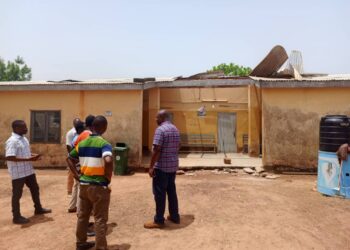Sandema Municipality has recently been plagued by an erratic electricity supply, causing significant disruptions to daily life. The frequent and unpredictable power outages have far-reaching consequences, affecting various aspects of the community, from businesses to education, public safety, and household appliances. Despite the widespread impact, there seems to be a troubling lack of communication or explanation from authorities, leaving residents frustrated and helpless.
Like many other communities, the economic lifeblood of Sandema Municipality is heavily reliant on electricity. Small businesses, particularly those involved in manufacturing, retail, and services, depend on a consistent power supply to operate machinery, run point-of-sale systems, and maintain the quality of perishable goods. With electricity being erratic, these businesses are facing insurmountable challenges.
Business operators like tailors, welders, and other artisans are those who are badly hit by the current situation. They find themselves unable to fulfil orders on time, leading to a loss of customers. Shops that rely on refrigeration for products like drinks, dairy, and frozen foods are struggling to keep these items from spoiling, resulting in significant financial losses. In some cases, businesses have been forced to close down entirely, unable to cope with the unpredictability of the electricity supply. The situation is creating an economic downturn in the area, with unemployment rates threatening to rise as businesses fail.
Education is another critical area being severely affected by the erratic power supply. Students, particularly those in their final year preparing for crucial exams, are finding it increasingly difficult to study during evening preps. Without electricity, schools are plunged into darkness, making it impossible for students to read, complete assignments, or revise their notes.
This disruption to their study routine is likely to have long-term effects on their academic performance. The lack of electricity during critical study hours not only demoralizes students but also contributes to an uneven playing field, where students from more stable areas may perform better simply due to better access to electricity. The situation is dire, with the future of these students hanging in the balance, yet there has been little to no response from those responsible for the power supply.
Public safety in the Municipality is also under threat due to the frequent power outages. Darkness provides a cover for criminal activities, and with the municipality often plunged into pitch blackness, there is a growing concern that crime rates could escalate. Residents are already feeling unsafe, as the power outages often occur at night, making it difficult to move around or keep a watchful eye on their surroundings.
The absence of street lighting and the inability to use security cameras and other surveillance equipment during outages further exacerbates the situation. As a result, people are increasingly concerned about the potential for theft, burglary, and other crimes. If the erratic electricity supply continues unchecked, the municipality could see a rise in criminal activities, adding another layer of hardship to an already struggling community. I spoke with a filling station attendant who said people don’t want to talk because, as others complain about the situation, they are tagged as anti-government or described as antagonists to the ruling NPP government. But what has politics got to do with a depression situation like this? Does the situation not affect all in the community
Health care delivery, particularly for individuals who rely on electricity for medical devices, such as oxygen concentrators or refrigeration for essential medications like insulin is also badly affected. The lack of a reliable power source puts these individuals at severe risk, as their health conditions could worsen without proper support. The situation is so serious that the light goes off every night. What is pathetic is the fact that it goes off and on more than several times before it finally goes off every night until the next day.
The situation is also wreaking havoc on household electrical gadgets and appliances. The frequent switching on and off of power creates voltage surges that can damage sensitive electronics like televisions, refrigerators, and computers. For many residents, these appliances represent significant investments, and the cost of repairs or replacements is often beyond their means.
In some cases, the damage is irreparable, leading to the complete loss of these devices. This not only adds to the financial burden on households but also reduces the quality of life, as essential appliances like refrigerators and fans are necessary for daily comfort and convenience. The situation is further aggravated by the lack of accountability from the power providers, with no compensation or explanation offered to affected residents.
One of the most frustrating aspects of this situation is the complete lack of communication between electricity providers and relevant authorities. Despite the widespread impact of the erratic power supply, there has been no official statement or explanation as to why the outages are occurring or what is being done to resolve them. This silence is breeding resentment and mistrust among the residents, who feel abandoned and neglected by those who are supposed to ensure a reliable electricity supply.
The absence of clear communication also means that residents are left in the dark—both literally and figuratively—about how to prepare for or mitigate the effects of these power outages. It raises serious concerns about the transparency and accountability of the service providers, as well as the effectiveness of the regulatory bodies tasked with overseeing the electricity supply.
Conclusion
The erratic electricity supply in Sandema Municipality is more than just an inconvenience; it is a crisis that is affecting the economic, educational, and social fabric of the community. Businesses are on the brink of collapse, students are struggling to study, crime rates may soon rise, and household appliances are being damaged with impunity. The lack of communication from authorities only adds to the frustration and sense of helplessness felt by the residents. Immediate action must be taken to address these issues and restore normalcy to the lives of those affected.
Francis Baaladong
A concerned resident
Sandema



















